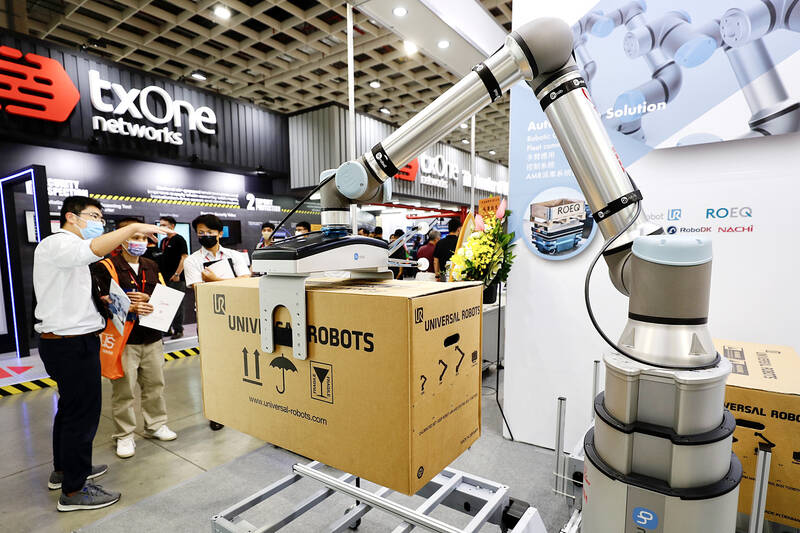Intelligent Asia, one of the largest industrial procurement platforms in the region, opened in Taipei yesterday, featuring automation and robotics, along with a wide range of other technologies.
Roughly 1,200 exhibitors at about 4,000 booths are displaying technologies in the fields of logistics, cold chain, 3D printing, molds and dies, lasers, fluid power and smart machinery.
The event is to run until Saturday at the Taipei Nangang Exhibition Center’s Halls 1 and 2.

Photo: RITCHIE B. TONGO, EPA-EFE
Taiwanese, German, Japanese and Swiss firms are showcasing automation and robotics technologies, featuring industrial computers, industrial control systems, robotic arms, automation software, measuring and inspection equipment, automated guided devices, processing tools, and artificial intelligence applications, the event’s organizers said.
President Tsai Ing-wen (蔡英文) told the opening ceremony that Taiwan aims to partner with regional economies in the development of smart manufacturing, at a time when global supply chains are being restructured and business opportunities in digital transformation are emerging as a result of the COVID-19 pandemic.
Her administration has prioritized the development of smart machinery and it continues to offer incentives for Taiwanese investors in that field to return home, she said.
Taiwan is looking to integrate its hardware and software expertise at this critical time for the development of smart manufacturing, Tsai said, noting the nation’s ranking in this year’s World Competitiveness Yearbook.
Taiwan moved up one spot from last year to seventh place and maintained its ranking as the third-most competitive economy in Asia in the yearbook compiled by the International Institute for Management Development.
With a ministry of digital affairs set to be inaugurated tomorrow, Taiwan is poised to accelerate its digital transformation and build a digital economy, Tsai said.
One of Taiwan’s major goals is to achieve net-zero emissions by 2050 and the government would invest NT$900 billion (US$29.73 billion) over the next eight years, she said.
Advantech Co Ltd (研華), the world’s biggest industrial PC maker, said at the event that it would, with its counterparts such as Smasoft Technology Co (偲倢科技), Hiti Industrial Automation Co (誠睿自動化), eAI Technology Inc (漢門科技), Prowave Engineering Inc (譜威科技) and Servtech Co (科智企業), push for green industrial transformation.

UNCERTAINTY: Innolux activated a stringent supply chain management mechanism, as it did during the COVID-19 pandemic, to ensure optimal inventory levels for customers Flat-panel display makers AUO Corp (友達) and Innolux Corp (群創) yesterday said that about 12 to 20 percent of their display business is at risk of potential US tariffs and that they would relocate production or shipment destinations to mitigate the levies’ effects. US tariffs would have a direct impact of US$200 million on AUO’s revenue, company chairman Paul Peng (彭雙浪) told reporters on the sidelines of the Touch Taiwan trade show in Taipei yesterday. That would make up about 12 percent of the company’s overall revenue. To cope with the tariff uncertainty, AUO plans to allocate its production to manufacturing facilities in

Taiwan will prioritize the development of silicon photonics by taking advantage of its strength in the semiconductor industry to build another shield to protect the local economy, National Development Council (NDC) Minister Paul Liu (劉鏡清) said yesterday. Speaking at a meeting of the legislature’s Economics Committee, Liu said Taiwan already has the artificial intelligence (AI) industry as a shield, after the semiconductor industry, to safeguard the country, and is looking at new unique fields to build more economic shields. While Taiwan will further strengthen its existing shields, over the longer term, the country is determined to focus on such potential segments as

TAKING STOCK: A Taiwanese cookware firm in Vietnam urged customers to assess inventory or place orders early so shipments can reach the US while tariffs are paused Taiwanese businesses in Vietnam are exploring alternatives after the White House imposed a 46 percent import duty on Vietnamese goods, following US President Donald Trump’s announcement of “reciprocal” tariffs on the US’ trading partners. Lo Shih-liang (羅世良), chairman of Brico Industry Co (裕茂工業), a Taiwanese company that manufactures cast iron cookware and stove components in Vietnam, said that more than 40 percent of his business was tied to the US market, describing the constant US policy shifts as an emotional roller coaster. “I work during the day and stay up all night watching the news. I’ve been following US news until 3am

COLLABORATION: Given Taiwan’s key position in global supply chains, the US firm is discussing strategies with local partners and clients to deal with global uncertainties Advanced Micro Devices Inc (AMD) yesterday said it is meeting with local ecosystem partners, including Taiwan Semiconductor Manufacturing Co (TSMC, 台積電), to discuss strategies, including long-term manufacturing, to navigate uncertainties such as US tariffs, as Taiwan occupies an important position in global supply chains. AMD chief executive officer Lisa Su (蘇姿丰) told reporters that Taiwan is an important part of the chip designer’s ecosystem and she is discussing with partners and customers in Taiwan to forge strong collaborations on different areas during this critical period. AMD has just become the first artificial-intelligence (AI) server chip customer of TSMC to utilize its advanced